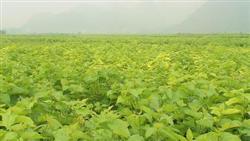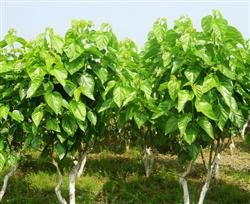Prevention and Control of Diseases and insect pests of Mulberry after Summer cutting

First, disease mulberry red rust. The symptom is that the tender buds are swollen after being killed, showing abnormal bending, and the surface is covered with yellow micro-raised dots (rust seed apparatus). The leaves were killed, at first, the disease spots with round and glossy, slightly raised yellowish spots were scattered on both sides of the back, and then gradually thickened and raised into orange spots. In the later stage of the disease, the epidermis of the disease spots ruptured and scattered orange powder (rust spores) covered with the whole leaf. The leaves are easy to fall off, commonly known as iron rust. Prevention and control methods: at the end of July and the beginning of August, 80% Dysen zinc wettable powder 250-300 times liquid spray, 7-10 days once, 2-3 times in a row. After the mulberry root of mulberry bacterial wilt was damaged, the plant lost water, and the leaves withered and drooped. The lateral taproot and lateral root of the long-diseased plant showed wet rot, some blackened and decayed, and the whole plant withered. Prevention and treatment: at present, there is no specific drug for the prevention and treatment of the disease. Prevention must be strengthened. According to the author's practical experience, agricultural streptomycin should be used to control mulberry trees 10 to 15 days after summer felling. When mulberry purple feather disease occurs, the root skin initially turns yellowish brown, losing luster, and then gradually dark brown, leaving only detached cork and xylem. The surface of the injured root is covered with a purple sclerotia with a filamentous purplish red rhizomatous hyphae. After the mulberry root was damaged, the branches and leaves grew slowly, and finally the whole plant withered. Control method: 667 square meters with 50% carbendazim 5 kg soil mixed with ploughing and sprinkling. Second, the serious pests from July to September are mulberry thrips, mulberry whitefly, leaf mites, mulberry inchworm, mulberry borer and so on. Corresponding measures should be taken to control different insect pests.
- Prev

Mulberry cultivation techniques
Mulberry is a perennial woody plant, is a long-lived tree species, naturally growing mulberry has the longest life span of more than a thousand years. The cultivated mulberry is affected by artificial cutting and long-term leaf harvesting, and its life is much shorter, but its full-growing period is more than 10 years. First, the establishment of the new mulberry garden (1) choose the site to choose the soil layer.
- Next

Pest control and fertilization of mulberry in spring
First, we should strengthen the prevention and control of insect pests. The harm to mulberry trees in spring is "mulberry inchworm" and "mulberry caterpillar", which mainly feed on mulberry buds and tender leaves. The control method can be sprayed with 1000-fold solution of dichlorvos in the mulberry bud stage, and mainly captured artificially after the mulberry leaves grow up. Second, timely fertilization. Timely application of spring fertilizer can promote.
Related
- Fuxing push coffee new agricultural production and marketing class: lack of small-scale processing plants
- Jujube rice field leisure farm deep ploughing Yilan for five years to create a space for organic food and play
- Nongyu Farm-A trial of organic papaya for brave women with advanced technology
- Four points for attention in the prevention and control of diseases and insect pests of edible fungi
- How to add nutrient solution to Edible Fungi
- Is there any good way to control edible fungus mites?
- Open Inoculation Technology of Edible Fungi
- Is there any clever way to use fertilizer for edible fungus in winter?
- What agents are used to kill the pathogens of edible fungi in the mushroom shed?
- Rapid drying of Edible Fungi

